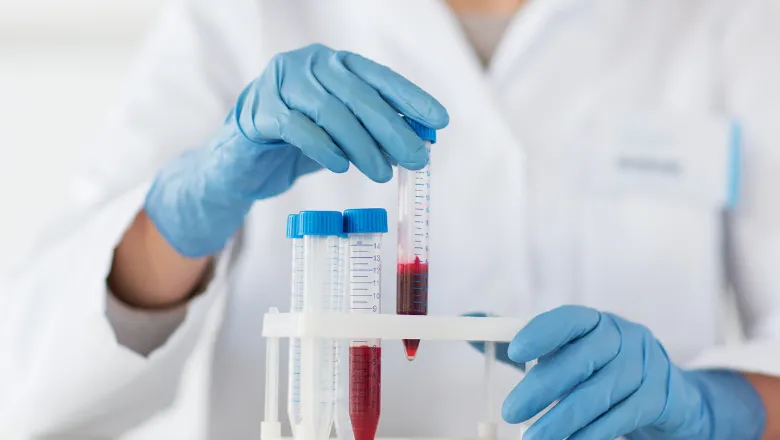This is an exciting opportunity to combine resources and deliver world-leading research that benefits our local community, and which has a global relevance.
Professor Philip Newsome, Director of the RW-ILS
02 September 2024
King's College London and the Foundation for Liver Research announce new institute dedicated to liver studies
King’s College London and the Foundation for Liver Research (FLR) are pleased to announce the establishment of the Roger Williams Institute of Liver Studies (RW-ILS). The new Institute brings together the Foundation for Liver Research’s Roger Williams Institute of Hepatology and the University’s Institute of Liver Studies, under the leadership of Professor Philip Newsome.

The Institute represents an exciting opportunity to combine resources and research strengths across the University, King’s College Hospital NHS Foundation Trust (KCH) and the Roger Williams Institute of Hepatology, enabling the delivery of the very highest quality liver research at scale.
The announcement comes after Professor Newsome’s appointments as Director of the Roger Williams Institute of Hepatology and senior Professor of Hepatology in the University’s School of Immunology & Microbial Sciences within the Faculty of Life Sciences & Medicine earlier this year.
The Roger Williams Institute of Hepatology – an independent research institute funded by the Foundation for Liver Research – focuses on various aspects of liver disease, spanning basic science, research technologies and translational research. With its fifty-year legacy of pioneering liver disease research, the Institute aims to break down the barriers between laboratory, clinical and critical care settings to improve outcomes for patients.
Uniting expertise from the two Institutes, the Roger Williams Institute for Liver Studies will allow for the integration of fundamental, translational and clinical investigative research across a wide range of liver diseases while the Board of Trustees of the FLR and its infrastructure will continue to maintain financial independence and monitor research projects. The RW-ILS will continue to build upon international collaborations established by its founding institutions and be committed to training the next generation of scientists within the field. It will bring together researchers, clinicians and professional staff, and I commend this advance.
Colonel Hamon Massey, Chairman of Trustees of the Foundation for Liver Research
The Institute of Liver Studies, part of the University’s School of Immunology & Microbial Sciences, is a clinical academic partnership between the University and KCH. It is one of Europe’s largest comprehensive academic liver centres and is dedicated to the care of patients with all types of liver diseases. It hosts a world-renowned adult and paediatric liver transplant programme and has unparalleled expertise in the management of a variety of liver diseases.
Professor Alberto Sánchez-Fueyo, Deputy Director of the RW-ILS, said, “The merger of the RW Institute of Hepatology and King’s Institute of Liver Studies into a single university department has been a long due ambition of liver investigators within the Denmark Hill campus. The new department will rationalise the use of current infrastructures and help establish the strong synergies that will put us on track to become one of the world’s top comprehensive academic liver units.”
The RW-ILS will be based at the King’s Denmark Hill campus, as a department within the School of Immunology & Microbial Sciences.
This is a momentous milestone in our ambition for King’s liver research and innovation to be truly world leading. By integrating the excellent building blocks we have across the University, FLR and the Trust and linking to wider strengths across the Faculty, we are in a position to make a major impact locally and internationally. My sincere thanks to all those who have worked tirelessly to bring us to this point.
Professor Ajay Shah, Executive Dean, Faculty of Life Sciences & Medicine
Professor Richard Trembath, Senior Vice-President Health and Life Sciences and Executive Director, King's Health Partners, said, “To address the significant challenges that still exist in liver related disorders, it has become evident that it is necessary to draw upon expertise, technology and wider infrastructure, that just cannot readily be resourced through any one grouping.
I am absolutely delighted that through working closely with each of the interested parties, namely the FLR, King’s and KCH, we have now reached agreement to integrate activities, to accelerate delivery of the shared ambition, to improve outcomes for patients and their families. We seek to do this, whilst creating an outstanding environment to train the next generation of researchers, the envy of most Centres across the UK and I believe beyond.”
Professor Leonie Taams, Head of School of Immunology & Microbial Sciences at King’s, said, “I am delighted to see the coming together of the Roger Williams Institute of Liver Studies as a Department in the School of Immunology & Microbial Sciences. This new Department will unite, strengthen and support our academic, clinical and educational activities in liver-related diseases with the ambition to improve treatment options and outcomes for patients.”





